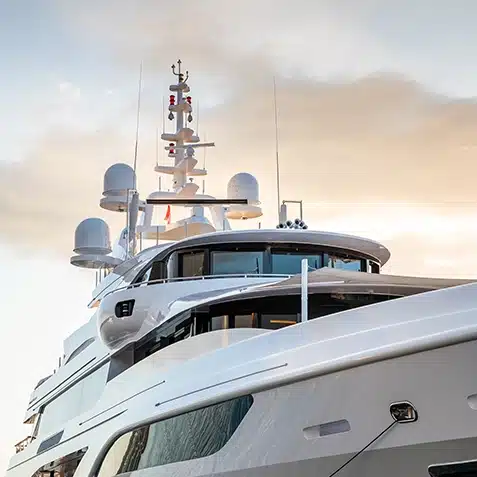Superyacht Operations Course
Become a Certified Superyacht Operations Specialist
Studying the Superyacht Operations Diploma is perfect for captains and senior crew as well as shore based professionals such as, yacht managers, brokers, yacht agents, recruitment consultants, marine lawyers, owners representatives and project managers.
The Superyacht Operations Diploma will develop and deepen your knowledge of the Superyacht industry and its onboard operations, which in turn will help you to excel in your career. Whether you work at sea or on land, this course will provide you with essential industry knowledge and skills, giving you a better understanding of how to run a Superyacht with success and efficiency. This understanding can then be built on further with the Superyacht Management online course which allows you to further develop your skillset and forge a successful superyacht management career.


Duration:
12 – 18 months

Modules:
12 in total

Cost:
Diploma: £3,195
Certificate: £2,295

Recognised by: 
If you’re ready to enrol, download the application form below.
Superyacht Operations Diploma vs Certification
Choose the right path for your career:
Diploma - £3,195
Ideal for anyone looking to gain a prestigious qualification & recognised certification for a rewarding career in xxx.
Certificate - £2,295
Ideal for anyone looking to learn more about the course materical and learn more about the industry.
Superyacht Crew, Charter, Safety, Accounting & Regulatory Training
Module subjects include chartering, operational management, ISM, ISPS, personnel and interior management along with other essential subjects such as accounting, legal aspects, insurance, repairs and maintenance.
The course consists of 12 modules. All students are required to successfully complete and pass the module assignments. Diploma students will also be required to sit and pass a final examination.
1. An Introduction to the Superyacht Industry
- Historical development
- Different types and styles of yacht
- The industry today – designers, builders, crews, insurers, brokers
- The owners and their requirements
- The role of the yacht manager
- Where can the superyacht be found?
- Future trends
2. Personnel
- Crew structures and sizes
- The role of the Captain
- Crew character and qualification requirements including STCW 95
- Recruitment, training and retention
- Career progression
- Contracts of employment, terms and conditions, ships articles
- MCA and qualification requirements
- International Labour Organisation (ILO)
- The Maritime Labour Convention (MLC)
3. Operational Management
- Why do we need Management Systems?
- Authority, policies and standing orders
- Safety management
- Documentation and record keeping
- Personnel
- Risk assessment
4. Interior Management and Catering
- Hospitality management review
- Operating procedures and policies
- Quality management
- Health and safety
- Food and drinks service
- Housekeeping
- Specialist guest service
5. Accounting
- Financial policy
- Bookkeeping
- Accounting
- Budgeting
- Costing
- Cash management
- Internal controls
- Charter accounting
- Auditing
- Value Added Tax (VAT)
- Corporate ownership
- Anti money laundering
- Bribery Act
6. Chartering
- Superyacht chartering
- The Charter Broker Network
- Forms of charter agreement – what is included
- Chartering seasons and shows
- Commercial chartering or to defray costs
- Customer relations and fixing a charter
- Managing the charter – crew and guests
7. Repairs and Maintenance
- Health & safety
- Routine maintenance v condition monitoring
- Proper planning
- The owner and the budget
- Enlisting outside help
- Repair/refit facilities and periodic maintenance
- Yard tenders and tender evaluation
- Paint maintenance and paint system repairs
8. Legal Aspects of Superyacht Management
- Introduction to English Law and the National legal system
- The Law of Contract
- The Law of Tort (negligence)
- Liability in Contract & Tort
- Responsibilities
- Admiralty Law and Jurisdiction
- International Maritime Law
- Governmental control of shipping
- Shipboard documentation
- Codes of practice for commercially operated yachts
- The Flag State
- Pollution
- Chartering commercially operated yachts
- Health and safety on board ship
- Marine Insurance
- Value Added Tax (VAT)
- Recreational craft directive
- Finance
- Employment of seamen in UK flag yachts
- Conduct and discipline
9. Insurance
- Introduction
- The legal side of marine insurance
- The practical side of marine insurance
10. New Building Project Management
- Defining requirements and obtaining viable tenders for building the vessel
- Analysing tenders, contract negotiations and signing
- Design development, project management, plan approval, inspection, trials and delivery
11. Security and ISPS
- Yacht security
- The ISPS Code and how it affects superyachts
- Security personnel and duties
- Searching and search procedures
- Yacht Security systems
- Owner and guest security ashore
- Superyacht crews
- Piracy and armed robbery
12. The International Safety Management Code (ISM)
- Introduction
- Key players
- Legal and insurance implications
- Practical aspects of the code
Student Success Story
The knowledge and work invested into the course material is astonishing
The knowledge and work invested into the course material is astonishing. By the course’ completion, one does not only hold a certificate, but a library of references and tools to master upcoming industry questions.
Kenny
Student (Marine Engineering)
Meet the Course Director
Jonathan Beckett
Chief Executive at Burgess
Jonathan is Chief Executive of Burgess and one of the most successful, experienced, and popular yacht brokers in the industry, orchestrating the sale of many of the world’s most famous yachts.
He joined Burgess at the age of 23, working in Monaco with the company’s founder Nigel Burgess from 1981 to 1983, before moving to the UK to launch the London operation. Under Jonathan’s guidance, the company has developed from a ‘one man band’ into an all-service company, with specialist divisions in all aspects of the superyacht industry and multiple offices around the globe.
Jonathan has served on the Board of the Mediterranean Yacht Brokers Association (MYBA), was President of MYBA from 2000 to 2002 and has also chaired the MYBA Sales Committee. He is a founding member and former President of the Large Yacht Brokers’ Association (LYBRA). In 2016 he received the Leadership Award from the International Superyacht Society.
Jonathan graduated from Durham University with a BA Hons in Sociology and represented England Universities at rugby. He divides his time between the Monaco, London and New York offices, but when he is not travelling he enjoys spending time at home with his family, sailing and watching all sports – especially rugby.

Superyacht Operations Course FAQs
Find out more about the course with our FAQs below.
See our FAQ page for more questions answered about MTA courses.
Supported by:
Why Choose The Maritime Training Academy?

Flexible
Online learning allows you to study in your own time, at your own pace from anywhere in the world. This saves on travel and classroom costs and allows you to fit your studies around your job and progress your career.

Supportive
While the nature of distance learning is independent study, we recognise the importance of support. Students can contact us at any time during their course for assistance and our team of industry experts are always on hand for advice.

Expertise
We have over 50 industry experts writing, developing and advising on our course material. We truly believe that allowing students to tap into their expertise and knowledge is of the utmost importance to fulfil your dream career.
If you would prefer to complete this as a classroom-based course, please contact us.
